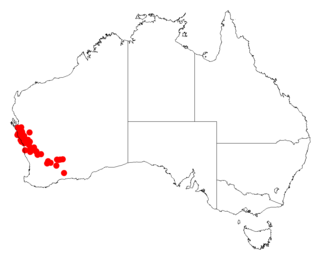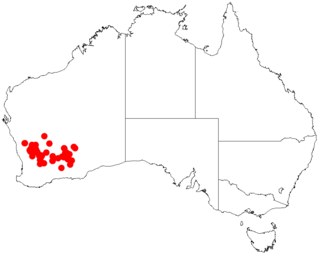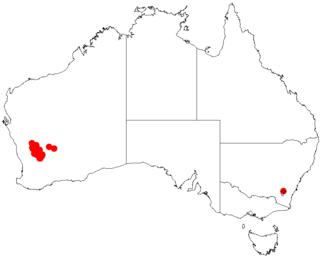
Acacia latior is a shrub belonging to the genus Acacia and the subgenus Juliflorae that is endemic to western Australia.

Acacia levata is a shrub belonging to the genus Acacia and the subgenus Juliflorae that is endemic to small arid area of western Australia.

Acacia lirellata is a shrub belonging to the genus Acacia and the subgenus Juliflorae that is endemic to south western Australia.

Acacia multispicata, commonly known as spiked wattle, is a shrub belonging to the genus Acacia and the subgenus Juliflorae that is endemic to south western Australia.

Acacia oldfieldii is a shrub belonging to the genus Acacia and the subgenus Juliflorae that is endemic to western Australia.

Acacia oncinocarpa is a shrub or tree belonging to the genus Acacia and the subgenus Juliflorae that is endemic to northern Australia.

Acacia signata is a tree or shrub belonging to the genus Acacia and the subgenus Juliflorae that is endemic to western Australia.

Acacia dentifera, commonly known as tooth-bearing acacia, is a shrub belonging to the genus Acacia and the subgenus Phyllodineae that is endemic to south western Australia.

Acacia leptospermoides is a shrub belonging to the genus Acacia and the subgenus Phyllodineae and is endemic to a large area of south western Australia.

Acacia sphacelata is a shrub of the genus Acacia and the subgenus Phyllodineae that is endemic to south western Australia.

Acacia eremaea is a shrub or tree of the genus Acacia and the subgenus Plurinerves that is endemic to an area in western Australia.

Acacia inceana is a shrub or tree of the genus Acacia and the subgenus Plurinerves that is endemic to south western Australia.

Acacia kenneallyi is a shrub or tree of the genus Acacia and the subgenus Plurinerves that is endemic to north western Australia.

Acacia nyssophylla, commonly known as pin bush, wait a while and spine bush, is a shrub of the genus Acacia and the subgenus Plurinerves that is endemic to a large area of central and south-western and southern Australia.

Acacia obtecta is a shrub of the genus Acacia and the subgenus Plurinerves that is endemic to a small area in south western Australia.
Acacia pelophila is a shrub of the genus Acacia and the subgenus Plurinerves that is endemic to a small area along the west coast of western Australia.

Acacia uncinella is a shrub of the genus Acacia and the subgenus Plurinerves that is endemic to an area of south western Australia.

Acacia juncifolia, commonly known as rush-leaf wattle, is a shrub or tree belonging to the genus Acacia and the subgenus Phyllodineae that is endemic to north eastern Australia.

Acacia siculiformis, commonly known as dagger wattle, is a shrub belonging to the genus Acacia and the subgenus Phyllodineae native to south eastern Australia.

Acacia blakei, commonly known as Blake's wattle or Wollomombi wattle, is a shrub belonging to the genus Acacia and the subgenus Juliflorae that is native to north eastern Australia.



















